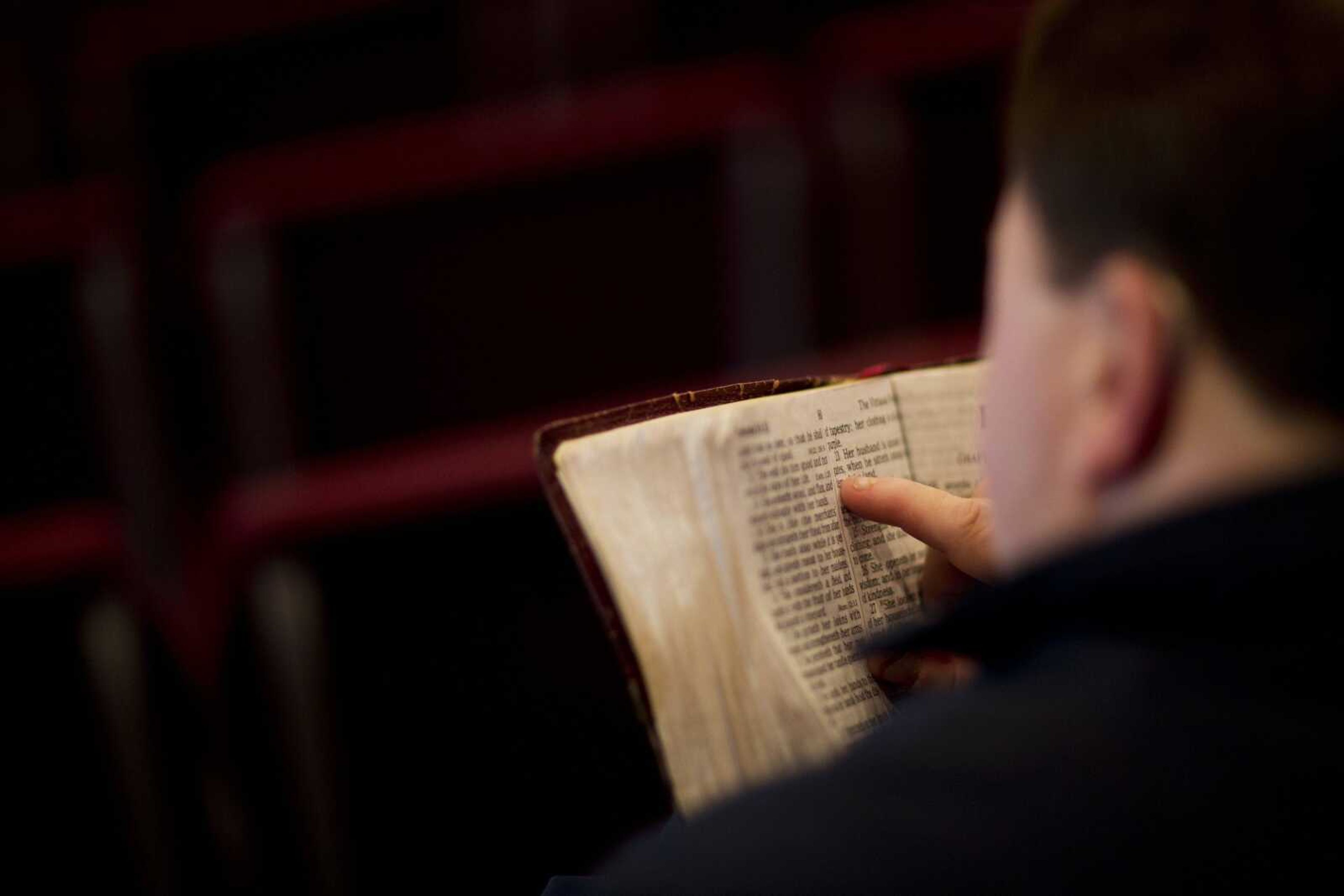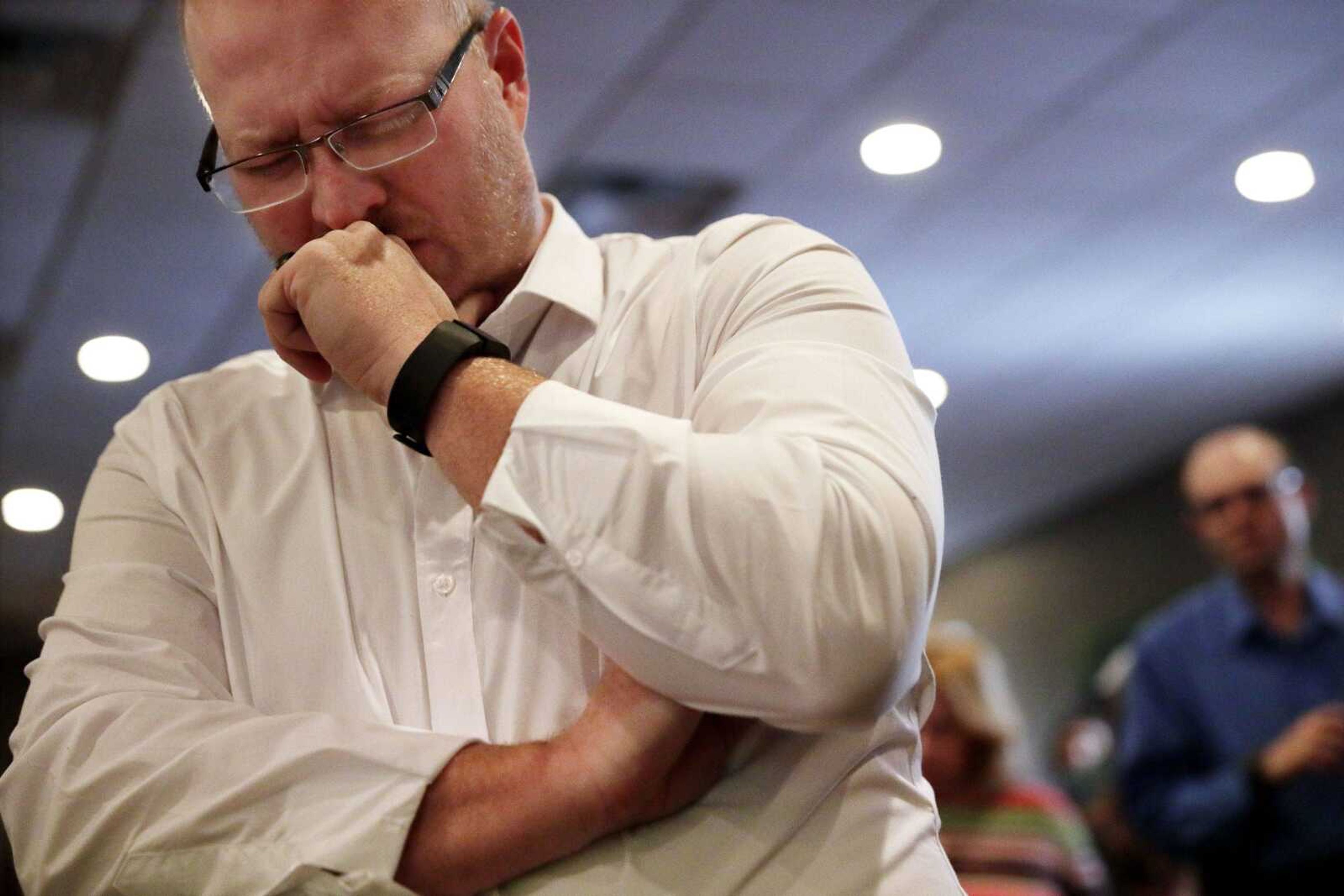Evangelicals in America feel alienated, anxious
BENTON, Kentucky -- Pastor Richie Clendenen stepped away from the pulpit, microphone in hand. He walked the aisles of the Christian Fellowship Church, his voice rising to describe the perils believers face in 21st-century America. "The Bible says in this life you will have troubles, you will have persecutions. And Jesus takes it a step further: You'll be hated by all nations for my name's sake," he said...
BENTON, Kentucky -- Pastor Richie Clendenen stepped away from the pulpit, microphone in hand.
He walked the aisles of the Christian Fellowship Church, his voice rising to describe the perils believers face in 21st-century America.
"The Bible says in this life you will have troubles, you will have persecutions. And Jesus takes it a step further: You'll be hated by all nations for my name's sake," he said.
"Let me tell you, that time is here."
The faithful in the pews needed little convincing. Even in this deeply religious swath of western Kentucky, conservative Christians feel under siege.

For decades, they say, they have been steadily pushed to the sidelines of American life and have come under attack for their beliefs, born of their reading of Scripture and their religious mandate to evangelize. The 1960s ban on prayer in public schools still is a fresh wound. Every legal challenge to a public Nativity scene or Ten Commandments display is another marginalization. They've been "steamrolled," they say, and "misunderstood."
Religious conservatives once could count on their neighbors to at least share their view of marriage. Those days are gone. Public opinion on same-sex relationships turned against conservatives even before the U.S. Supreme Court legalized gay marriage.
Now, many evangelicals say liberals want to seal their cultural victory by silencing the church. Liberals call this paranoid. But evangelicals see evidence of the threat in every new uproar over someone asserting a right to refuse recognition of same-sex marriages -- whether it be a baker, a government clerk, or the leaders of religious charities and schools.
At a time when America's divisions spill daily into people's lives, many Christian conservatives find themselves on the other side of between "us" and "them."
"There's nobody hated more in this nation than Christians," Clendenen preached on a recent Sunday. "Welcome to America's most wanted: You."
Evangelicals such as those at Christian Fellowship are wrestling with their declining clout in public life.
The U.S. remains solidly religious and Christian, and evangelicals still are a formidable bloc in the Republican Party. But a series of losses in church membership and in public policy battles, along with America's changing demographics, are weakening evangelical influence, even in some of the most conservative regions of the country.
"Nobody would have guessed the pace of change. That's why so many people are yelling, 'We have to take our country back,'" said Ed Stetzer, executive director of Lifeway Research, an evangelical consulting firm in Nashville, Tennessee.
The Protestant majority that dominated American culture through U.S. history has dipped below 50 percent.
Liberal-leaning Protestant groups started shrinking earlier, but some evangelical churches now are in decline. The conservative Southern Baptist Convention lost 200,000 from its ranks in 2014 alone, dropping to 15.5 million, its smallest number in more than two decades.
At the same time, the Bible Belt, as a cultural force, is collapsing, said the Rev. Russell Moore, head of the Southern Baptist public policy agency.
Nearly a quarter of Americans said they no longer affiliate with a faith tradition. It's the highest share ever recorded in surveys, indicating the stigma for not being religious has eased -- even in heavily evangelical areas. Americans who said they have no ties to organized religion now make up about 23 percent of the population, just behind evangelicals, who comprise about 25 percent, according to the Pew Research Center.
"People don't have to be culturally identified with evangelical Christianity in order to be seen as good people, good neighbors or good Americans," Moore said.
Politically, old-guard and religious-right organizations are greatly diminished or gone, and no broadly unifying leader or organization has replaced them. In this year's presidential race, the social-policy issues championed by Christian conservatives are not central.
White evangelical voters remain influential in early primaries, and they turn out at high rates in general elections. But they can't match the growth rate of groups that tend to support Democrats -- Latinos, younger people and Americans with no religious affiliation.
No issue has more starkly illuminated conservative Christians' waning influence than the struggle over same-sex marriage.
Evangelicals were "all in" with their opposition to gay rights back with the Moral Majority in the 1980s, said Robert Jones, author of "The End of White Christian America." In the 2004 election, Americans appeared to be on the same page, approving bans on same-sex marriage in all 11 states where the measures were on the ballot.
But by 2011, more than five in 10 Americans supported gay marriage. Now the business wing of the Republican Party is deserting social conservatives on the issue, largely backing anti-discrimination policies. Younger Americans are especially accepting of same-sex relationships, which means evangelicals "have lost a generation on this issue," Jones said.
"This issue is so prominent and so symbolic," said Jones, chief executive of Public Religion Research Institute, which specializes in surveys about religion and public life. "It was such a decisive loss, not only in the actual courts, the legal courts, but also in the court of public opinion."
Clendenen saw "a lot of fear, a lot of anger" in his church after the Supreme Court ruling.
If culture wars once felt remote amid the soybean and tobacco farms here, change is obvious to Clendenen's congregants.
In Rowan County, on the other side of Kentucky, clerk Kim Davis spent five days in jail last year for refusing on religious grounds to issue marriage licenses to same-sex couples.
The problem, many religious conservatives say, is government is growing more coercive in many areas bearing on their beliefs.
Some faith-based not-for-profit groups with government contracts have closed adoption programs because of new rules in some states that say agencies with taxpayer funding can't refuse placements with same-sex couples. Religious leaders worry Christian schools and colleges will lose accreditation or tax-exempt status over their codes of conduct barring same-sex relationships.
How to navigate this new reality?
Some conservative Christians are determined to more fiercely wage the culture wars.
There is, however, a segment that advocates upholding their beliefs, but doing so in a gentler way that rejects the aggressive tone of the old religious right and takes up other issues, such as ending human trafficking, that can cross ideological lines.
Clendenen is cut from this mold. Now 38, he came of age when the religious right was at its apex, and he concluded any mix of partisan politics with Christianity was toxic for the church. He said evangelicals are partly responsible for the backlash against them because of the hateful language some used in the marriage debates.
"I don't see the LGBT community as my enemy," he said.
Still, he uses the word "persecution" to describe what Christians are facing in the U.S., even though he feels strange doing so.
Preaching, Clendenen urged congregants to hold fast to their positions in a country that has grown hostile to them.
"Don't give up," he said. "Don't let your light go out."
Connect with the Southeast Missourian Newsroom:
For corrections to this story or other insights for the editor, click here. To submit a letter to the editor, click here. To learn about the Southeast Missourian’s AI Policy, click here.










